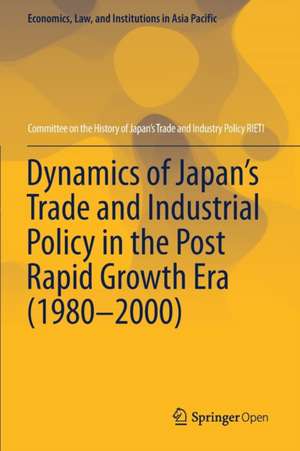Dynamics of Japan’s Trade and Industrial Policy in the Post Rapid Growth Era (1980–2000): Economics, Law, and Institutions in Asia Pacific
Autor RIETIen Limba Engleză Paperback – 18 sep 2020
This open access book provides an in-depth examination of Japan's policy responses to the economic challenges of the 1980s and '90s. While MITI's earlier role in promoting rapid growth has been addressed in other studies, this volume, based on official records and exhaustive interviews, is the first to examine the aftermath of rapid growth and the evolution of MITI's interpretation of the economy's changing needs. Covering such topics as the oil shocks, trade conflict with the United States, and the rise and collapse of the so-called bubble economy, it presents a detailed analysis and evaluation of how these challenges were interpreted by government officials, the kinds of policies that were enacted, the extent to which policy aims were realized, and lessons for the longer term. This book is recommended especially to officials of countries concerned about the challenges that follow on high economic growth and to readers interested in Japan’s contemporary economic history.
| Toate formatele și edițiile | Preț | Express |
|---|---|---|
| Paperback (1) | 423.47 lei 6-8 săpt. | |
| Springer Nature Singapore – 18 sep 2020 | 423.47 lei 6-8 săpt. | |
| Hardback (1) | 430.97 lei 6-8 săpt. | |
| Springer Nature Singapore – 8 apr 2020 | 430.97 lei 6-8 săpt. |
Din seria Economics, Law, and Institutions in Asia Pacific
-
 Preț: 282.94 lei
Preț: 282.94 lei - 18%
 Preț: 1134.24 lei
Preț: 1134.24 lei -
 Preț: 394.87 lei
Preț: 394.87 lei - 15%
 Preț: 699.77 lei
Preț: 699.77 lei - 18%
 Preț: 1011.14 lei
Preț: 1011.14 lei - 18%
 Preț: 1402.55 lei
Preț: 1402.55 lei - 18%
 Preț: 1397.82 lei
Preț: 1397.82 lei - 18%
 Preț: 728.43 lei
Preț: 728.43 lei - 18%
 Preț: 782.42 lei
Preț: 782.42 lei - 18%
 Preț: 779.08 lei
Preț: 779.08 lei -
 Preț: 313.82 lei
Preț: 313.82 lei - 18%
 Preț: 778.45 lei
Preț: 778.45 lei -
 Preț: 427.71 lei
Preț: 427.71 lei - 18%
 Preț: 722.26 lei
Preț: 722.26 lei - 18%
 Preț: 725.43 lei
Preț: 725.43 lei - 18%
 Preț: 1110.24 lei
Preț: 1110.24 lei - 15%
 Preț: 698.15 lei
Preț: 698.15 lei - 15%
 Preț: 699.59 lei
Preț: 699.59 lei - 18%
 Preț: 730.79 lei
Preț: 730.79 lei - 18%
 Preț: 1001.50 lei
Preț: 1001.50 lei - 18%
 Preț: 950.21 lei
Preț: 950.21 lei
Preț: 423.47 lei
Nou
Puncte Express: 635
Preț estimativ în valută:
81.03€ • 84.78$ • 67.31£
81.03€ • 84.78$ • 67.31£
Carte tipărită la comandă
Livrare economică 02-16 aprilie
Preluare comenzi: 021 569.72.76
Specificații
ISBN-13: 9789811519895
ISBN-10: 9811519897
Pagini: 322
Ilustrații: X, 322 p. 23 illus., 17 illus. in color.
Dimensiuni: 155 x 235 mm
Greutate: 0.47 kg
Ediția:1st ed. 2020
Editura: Springer Nature Singapore
Colecția Springer
Seria Economics, Law, and Institutions in Asia Pacific
Locul publicării:Singapore, Singapore
ISBN-10: 9811519897
Pagini: 322
Ilustrații: X, 322 p. 23 illus., 17 illus. in color.
Dimensiuni: 155 x 235 mm
Greutate: 0.47 kg
Ediția:1st ed. 2020
Editura: Springer Nature Singapore
Colecția Springer
Seria Economics, Law, and Institutions in Asia Pacific
Locul publicării:Singapore, Singapore
Cuprins
1 Introduction: Overview.- 2 Japan's Industrial Structure: Forced to Change (1973–1982).- 3 The global responsibilities of an economic superpower (1981–1992).- 4 Long-Term Depression and Economic Structural Reform (1991–2000).- 5 Conclusion: The Emergence of a Twenty-First-Century Policy on the Economy and Industry.- References.
Textul de pe ultima copertă
This open access book provides an in-depth examination of Japan's policy responses to the economic challenges of the 1980s and '90s. While MITI's earlier role in promoting rapid growth has been addressed in other studies, this volume, based on official records and exhaustive interviews, is the first to examine the aftermath of rapid growth and the evolution of MITI's interpretation of the economy's changing needs. Covering such topics as the oil shocks, trade conflict with the United States, and the rise and collapse of the so-called bubble economy, it presents a detailed analysis and evaluation of how these challenges were interpreted by government officials, the kinds of policies that were enacted, the extent to which policy aims were realized, and lessons for the longer term. This book is recommended especially to officials of countries concerned about the challenges that follow on high economic growth and to readers interested in Japan’s contemporary economic history.
Caracteristici
The book examines policies carried out by the Ministry of International Trade and Industry after the high-economic growth period, from 1980 to 2000 The book presents an in-depth analysis and evaluation of MITI’s industrial policy based on official records and exhaustive interviews This book depicts the challenges for Japanese government officials after high economic growth period
